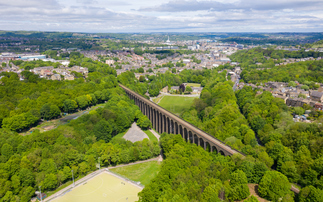The boss of this year's BusinessGreen Leaders Awards' Charity Partner reflects on the organisation's role in tackling the twin crises of mental health and climate change
Being out in nature can change the way people think about the world. We saw the best illustration of that only this month, when Prime Minister Theresa May came back from a walking holiday in the Alps so disturbed by the extent of the glacier retreat there that she immediately got to work drawing up legislation for a 2050 net zero emissions target.
Of course, not everyone who spends a few hours in the outdoors will come back with such clear resolve to 'do their bit' in the climate crisis, nor have within their gift the power to change national law.
But with mounting scientific research suggesting spending time in nature can rewire one's perception of the world for the better, the argument for getting more people out into the wild is becoming stronger than ever. Alongside increasing the extent to which people value the environment, evidence indicates that reconnecting with the natural world can act as a release valve for the pressures of modern life, including helping with mental health disorders such as depression and anxiety.
But such research stands in stark contrast with the reality of everyday life for thousands of people in the UK. "More than three quarters of people now live in cities," points out Jo Roberts, CEO of the Wilderness Foundation UK. "Many communities are disconnecting from nature."
The Wilderness Foundation UK, the charity partner for this year's BusinessGreen Leaders Awards, is working to turn this tide. The organisation uses immersion in nature to help empower vulnerable people in the UK, including thousands of children and teenagers. It has two inter-related aims: to harness nature to help people struggling with mental health issues, and to nurture the environmentalists of the future by helping people from all walks of life develop a deeper connection with the natural world.
We switch off technology and switch on reality
Speaking to BusinessGreen ahead of Wednesday's Awards Roberts lays bare the extent to which the natural world is an alien landscape for so many of today's city dwelling youngsters.
"Our focus as a Foundation - and David Attenborough said the same thing - is that unless you know and understand something you don't care to protect it," she explains.
"We've just been working with a group who came from a school in Newham, and most of those children don't go outside. The teacher was saying that for most of the children in the class, the parents don't go outside, because it's not something they have been brought up to do. And therefore the children don't go outside."
This lack of exposure to the outside not only risks the natural world missing out on the next generation of powerful advocates for its protection, but is also seriously threatening the mental wellbeing of young people, Roberts argues.
"I'm not someone who is against technology, but we have been overtaken," she says. "We see young people who don't see anybody for six months, only their parents or their siblings, because they are gaming all day, sometimes 20 hours a day… They don't come out their rooms, so they don't watch the clouds scud past, they don't see the sunrise or sunset, they don't hear birds sing. They are just completely quarantined in four walls."
"Our whole evolutionary process was one with a direct relationship with nature, which is gone," she warns.
Sending people out into nature is a key part of the charity's work | Credit: Wilderness Foundation UK
While a host of organisations are now touting activities such as "forest bathing" as the answer to the mental health crisis, the Wilderness Foundation is one of only a few charities which can claim to have very deep roots in this agenda. The organisation was founded in the UK in 1976 by Dr Ian Player, an international conservationist who had been running similar wilderness programmes with disadvantaged people in South Africa since the 1950s.
The organisation still runs trips from the UK to South Africa for groups of young leaders, but much of its work is focused on providing a broad range of nature-based support schemes, workshops, and programmes within the UK. These range from Forest Schools for primary school children to 'wilderness therapy', living classrooms, expeditions, outdoor camps, and mentoring programmes for adults and young people battling anxieties, addiction, and other life-limiting issues. With one in seven British teenager suffering from anxiety or depression, such programmes are arguably needed now more than ever.
And despite all the feverish reporting of the 'Greta Thunberg effect', suggesting young people around the world are being mobilised en masse to fight for climate action, the reality is that many young people are trapped in personal struggles that stop them engaging with wider issues, according to Roberts. She suggests that as such there is a worrying class divide emerging in the world of climate activism.
"We still send leadership quality teenagers, mainly from private schools and cadet forces, to South Africa on deep immersion wilderness trails," she says. "Those young people are much more alert and aware, and very focused [on climate change]. When we work with much more vulnerable youth, those more in contact with the police, in and out of mental hospitals, it's almost like their own personal issues are so overwhelming that they can't lift their eyes up to see the rest of the world around them."
Yet given the chance, young people can find a route out of their personal struggles through environmentalism. Roberts cites the case of a 16 year old girl, Felicity, who she says two years ago "didn't want to live anymore". "Now she's collecting rubbish on the side of the road, she's campaigning for people to use non-animal tested beauty products, and is going to be speaking at the Royal Geographic Society for us in September," she reflects.
Part of the Foundation's aim for the coming year is to focus more on its role as an incubator for this kind of environmental leadership, for opening up young adults to the climate crisis and encouraging them to speak up on nature's behalf. "We want to reach a much much bigger community of young people… and at the same time grow our environmental leadership," says Roberts. "How can we bring more of the issues around climate change, and Extinction Rebellion [into our work] without it becoming too big an angle? How can we be sure that we are equipping all of our young people, those from extraordinarily deprived trauma-led backgrounds to those at Eton College, so that they all have the tools and mechanisms with which to go out and continue to make a difference?"
Wilderness Foundation has won endorsement from the Duke and Duchess of Sussex | Credit: Wilderness Foundation UK
Of course, achieving all this requires an ever increasing level of funding. Fortunately the Wilderness Foundation won a major boost in this department in 2017, when Prince Harry and Meghan Markle chose it as one of seven charities to receive donations in place of wedding gifts for their 2018 nuptials.
In addition to providing the charity with a boost to the coffers, the recognition from the royal couple delivered lasting publicity gains that have helped it attract more long-term backers of its work, Roberts says. "It did a huge amount of confidence building for other investors and funders," she confirms. The charity is currently backed by a range of funders, including River Island, the Dulverton Trust, and the National Lottery, as well as individual philanthropists. Attendees at the BusinessGreen Leaders Awards will have a chance to join them this week in supporting one of the UK's most innovative and important green charities.
Perhaps now more than ever, the Wilderness Foundation is tapping into a powerful cultural zeitgeist, straddling the parallel concerns of a crisis in mental and planetary health. GPs are issuing "nature prescriptions" at the same time as biodiversity experts are warning the fate of the natural world hangs in the balance. A report from 27 national science academies earlier this month found that the climate crisis could spark a surge in mental health issues over the long term, including post-traumatic stress disorder, anxiety, substance abuse, and depression.
In the Foundation's work, these two issues converge. It is a charity which understands, on the most fundamental level, that humans need nature as much as nature needs us. Whether it's a hike across the Alps or a walk in the woods, changing people's relationship with nature could just be the key to changing the world.









